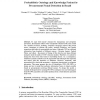Free Online Productivity Tools
i2Speak
i2Symbol
i2OCR
iTex2Img
iWeb2Print
iWeb2Shot
i2Type
iPdf2Split
iPdf2Merge
i2Bopomofo
i2Arabic
i2Style
i2Image
i2PDF
iLatex2Rtf
Sci2ools
SEMWEB
2009
Springer
2009
Springer
Probabilistic Ontology and Knowledge Fusion for Procurement Fraud Detection in Brazil
To cope with society’s demand for transparency and corruption prevention, the Brazilian Office of the Comptroller General (CGU) has carried out a number of actions, including: awareness campaigns aimed at the private sector; campaigns to educate the public; research initiatives; and regular inspections and audits of municipalities and states. Although CGU has collected information from hundreds of different sources - Revenue Agency, Federal Police, and others - the process of fusing all this data has not been efficient enough to meet the needs of CGU’s decision makers. Therefore, it is natural to change the focus from data fusion to knowledge fusion. As a consequence, traditional syntactic methods must be augmented with techniques that represent and reason with the semantics of databases. However, commonly used approaches fail to deal with uncertainty, a dominant characteristic in corruption prevention. This paper presents the use of Probabilistic OWL (PR-OWL) to design and test a ...
CGU’s Decision Makers | Corruption Prevention | Internet Technology | SEMWEB 2009 | Traditional Syntactic Methods |
| Added | 27 May 2010 |
| Updated | 27 May 2010 |
| Type | Conference |
| Year | 2009 |
| Where | SEMWEB |
| Authors | Rommel N. Carvalho, Kathryn B. Laskey, Paulo Cesar G. da Costa, Marcelo Ladeira, Laécio L. Santos, Shou Matsumoto |
Comments (0)

